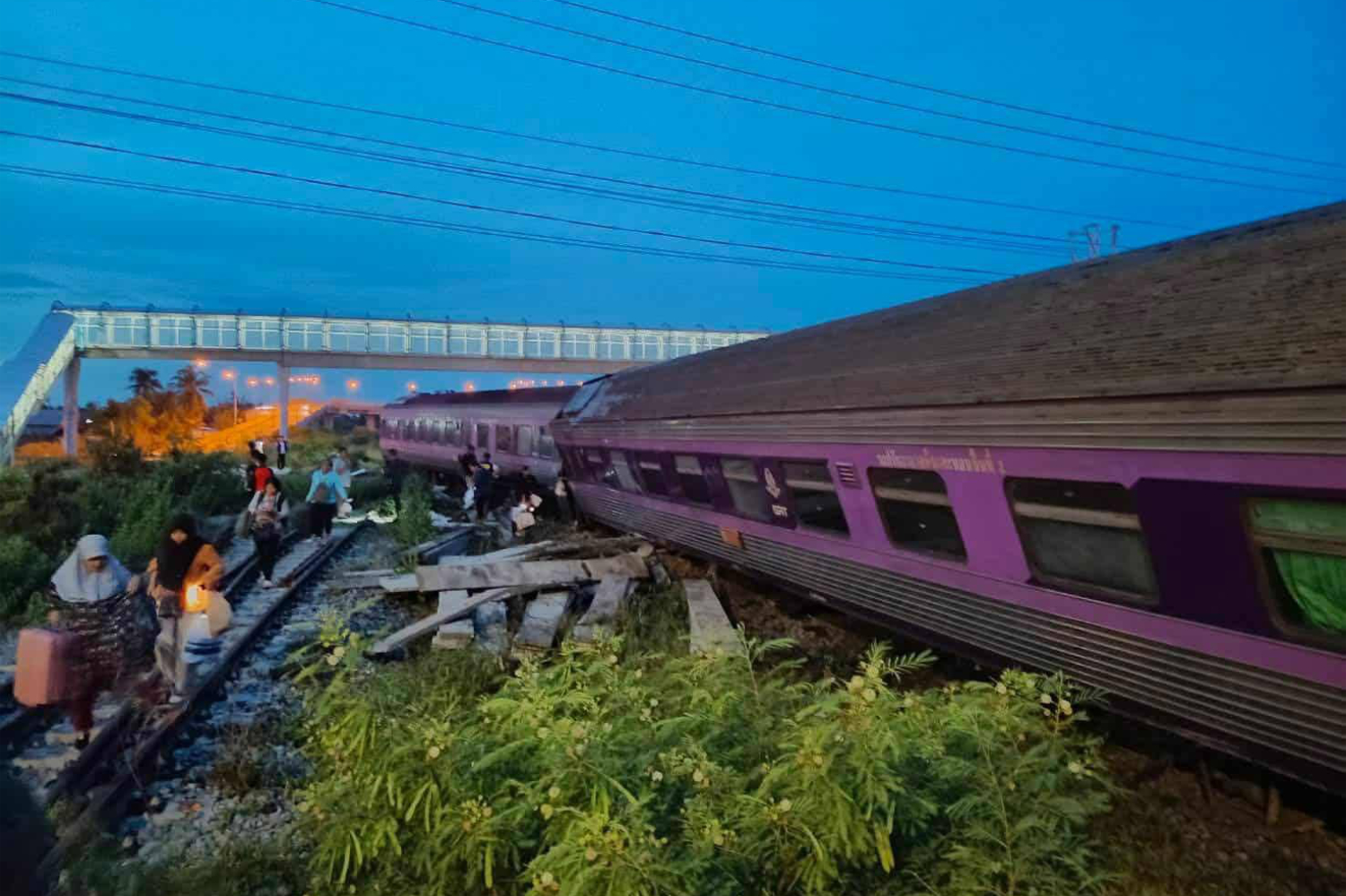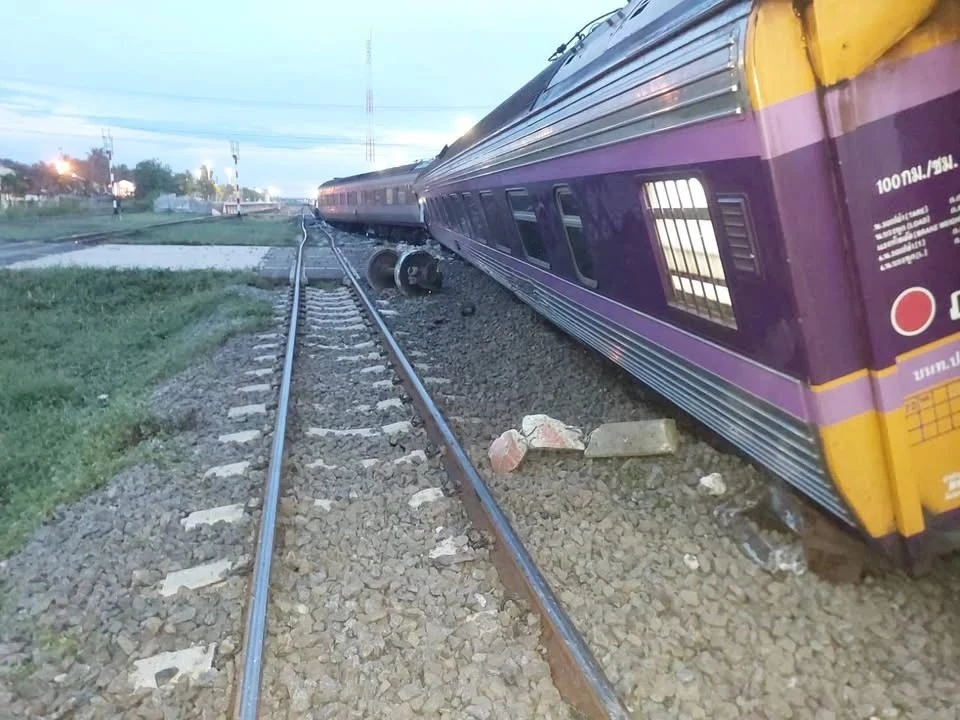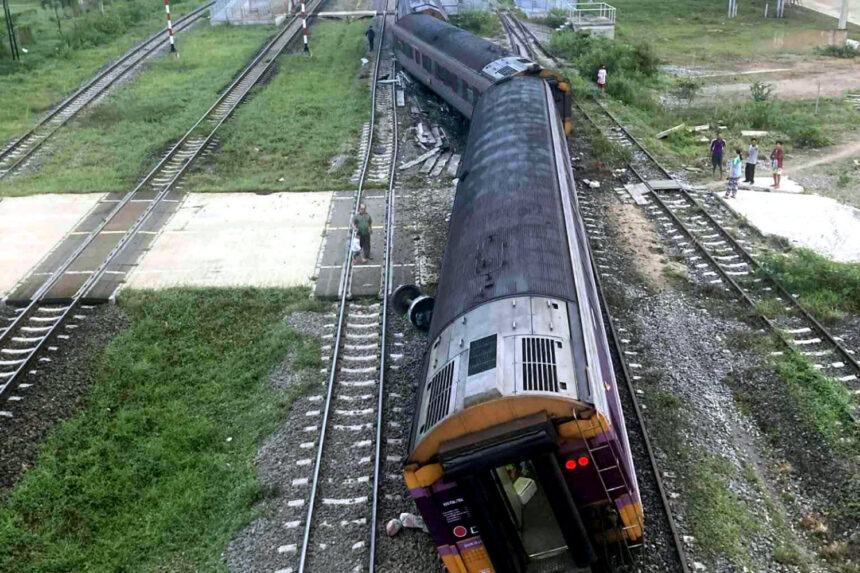PRACHUAP KHIRI KHAN – Early on Saturday morning, a special express train heading to Bangkok derailed near Kui Buri station, causing injuries to nine people and putting railway safety in Thailand back in the spotlight.
The accident happened around 5:00 AM when three carriages from the Su-ngai Kolok to Krungthep Aphiwat (Bang Sue) service, train No. 38/46, left the tracks but did not tip over.
The derailment halted southern rail traffic, with staff quickly evacuating all passengers and arranging other ways for them to reach their destinations.
The train, which had 12 carriages in total, was travelling from Su-ngai Kolok in Narathiwat to the capital when the incident occurred. Passengers shared stories of confusion and fear as carriages 1050, 1119 and 1113 slipped off the rails.
Among those injured were a Buddhist monk, a young girl, and seven women.
Some suffered nothing more than bruises, while others needed hospital care for more serious injuries. Emergency teams and local officials responded fast, getting those injured to Kui Buri and Prachuap Khiri Khan hospitals.
Passengers from the carriages that stayed on the track got help with onward travel, with the State Railway of Thailand (SRT) providing vans and other transport.
Photos from the scene showed people leaving the derailed train and large equipment being used to clear the area. The SRT confirmed that southern train services started running again later that day, though with some delays, as workers worked hard to put the derailed carriages back in place.
Investigators are still trying to work out if the problem was caused by issues with the tracks, mechanical faults, or something else.
A member of the Poh Teck Tung Foundation, which handled emergency care, described the incident as hectic but under control. “We made sure the injured were safe and got medical help straight away,” they explained. “We are thankful there were no deaths, but situations like this show more safety steps are needed on trains in Thailand.”

Official Response from the State Railway
The SRT quickly released a statement offering apologies for what happened and confirming an investigation had started. “The safety of our passengers comes first,” the statement read. “We are working closely with authorities to find out why this derailment happened and will make all the changes needed to stop this from happening again.”
The SRT added that train services in the south were running again, even though some were late, and that they took care of affected travellers with replacement vehicles and support.
Despite these assurances, there was an outcry online. On X (formerly Twitter), many posts criticised repeated train accidents. Some said the country’s old rail network needed urgent repairs and upgrades.
This latest incident follows a string of rail accidents in Thailand, once again drawing attention to old systems and safety worries. The country has experienced several major train accidents over the years, some with much worse outcomes than at Kui Buri.
The most deadly occurred on 1 August 1979, when a passenger train hit a freight train at Taling Chan Junction, killing 51 and injuring 138. It remains the worst rail disaster in Thai history.
More recently, in October 2009, a derailment in Hua Hin during a heavy rainstorm killed at least seven and left dozens hurt. In 2018, Trang and Songkhla each saw a derailment on the same day, though no one was badly hurt.
Other events have revealed deeper problems. In 2013, a derailment near Bangkok’s Lak Si station was blamed on the suspected theft of rail spikes that hold tracks down. Another crash in 2016, when a train and bus collided in Nakhon Pathom, killed three and injured 27. In 2020, a train hit a bus at a crossing in Chachoengsao, leading to 19 deaths and 40 injuries. This was one of the worst level crossing accidents in recent times.
Earlier this year, a freight train derailed close to Bang Saphan Yai station in Prachuap Khiri Khan, blocking southern routes but causing no injuries. In April 2018, a mysterious metal object on the tracks near Kui Buri forced a train to stop, nearly causing a derailment.
These regular incidents have led many to question whether the SRT can truly keep passengers safe.

Public Demand for Train and Rail Upgrades
The Kui Buri derailment has added fuel to calls for a full update of Thailand’s railways, many of which have not changed in decades. Critics have pointed to old tracks, outdated signals, and a lack of proper repairs as reasons for so many accidents.
Heavy rain is often mentioned as a cause, highlighting the need for stronger tracks and better checks during the rainy season. Earlier this year, a false report about a derailment in Phrae was debunked, but it drew attention to how often rain gets the blame for these problems.
Users on X voiced their disappointment with SRT’s approach, with one saying, “Another derailment in Thailand? When will they fix the tracks and focus on safety?” Others argued for larger government funding for railways, noting the contrast between new rail projects and the neglect of older lines.
The investigation into the Kui Buri crash continues, but it already stands as a warning sign for Thailand’s railway network. SRT’s promise to improve safety is being closely watched, but public confidence is still weak after many past incidents. The injured travellers, still recovering, are a reminder of the real risks at stake.
For people in Prachuap Khiri Khan and train users across the country, this derailment is more than just another report. It is a push for meaningful action. With plans to upgrade transport, keeping passengers safe must be a top goal. The Chiang Rai Times will keep following this story, including updates from the SRT probe and any new safety steps.
Until then, the people of Kui Buri and the wider Thai public are supporting those affected, wishing them a quick recovery and hoping for a safer future on Thailand’s railways.














